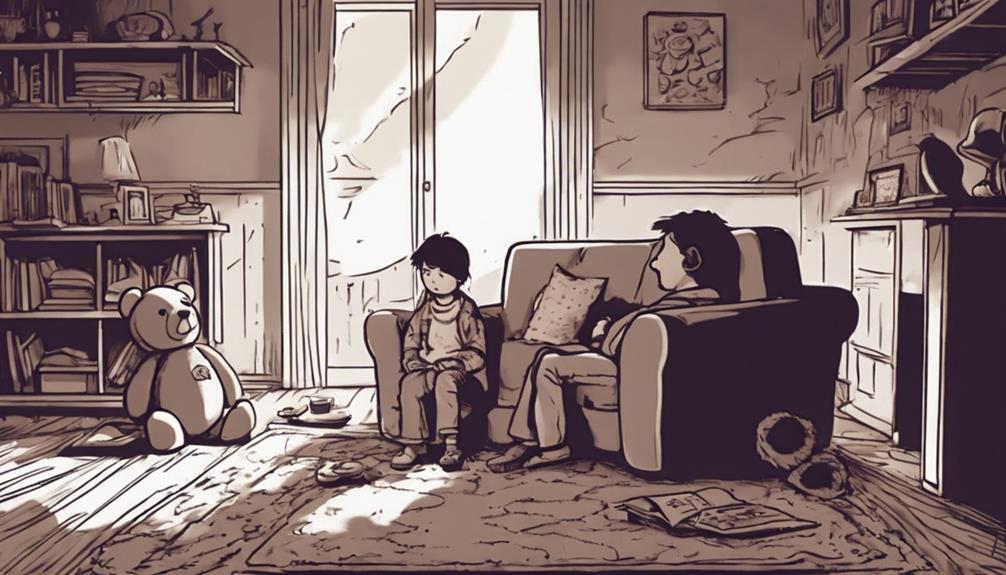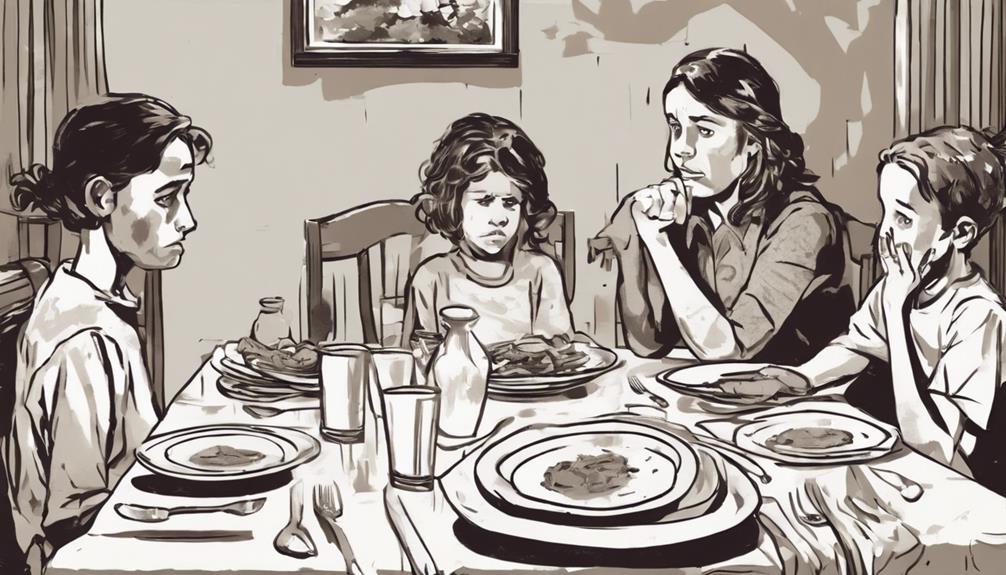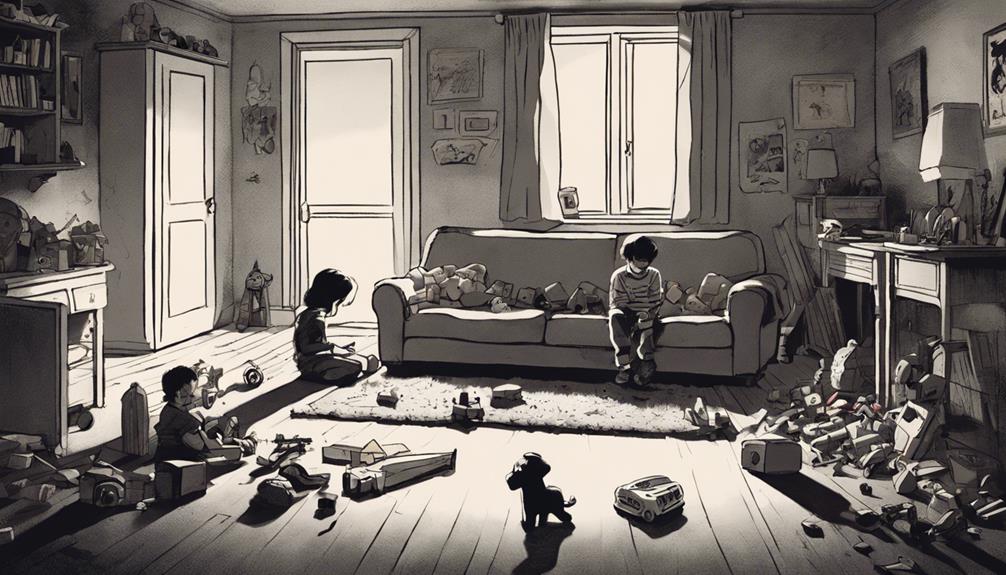Secret affairs can deeply harm children in families by creating emotional turmoil and eroding trust. You might notice increased anxiety, confusion, and even withdrawal from friends during this tumult. Children often feel caught in the middle of parental conflicts, leading to behavioral issues like aggression or depression. Their academic performance may suffer too, as emotional distress distracts them from schoolwork. Over time, these experiences can shape children's future relationships, causing lasting trust issues. Understanding this impact is significant, and further exploration can reveal ways to help families heal and rebuild connections amid such challenges.
Emotional Distress in Children

When parents engage in secret affairs, children often feel the emotional turmoil ripple through their lives, leaving them confused and vulnerable. You might notice subtle changes in your behavior, such as increased anxiety symptoms or a sense of disconnection from your parents. This emotional neglect can manifest in many ways, including withdrawal from friends or a decline in academic performance.
As a child in this situation, the constant uncertainty can make you feel like you're walking on eggshells. You may find yourself second-guessing your parents' intentions or feeling like you need to take on responsibilities beyond your years. This heightened sense of anxiety can lead to insomnia, irritability, or even physical symptoms like stomachaches.
It's essential to recognize that these feelings stem from the instability created by your parents' actions. You deserve a stable and nurturing environment where your emotional needs are met.
Seeking support from trusted adults or counselors can help you navigate these complex emotions, allowing you to articulate your feelings and regain a sense of control over your life. Understanding that you're not alone in this experience is a critical step toward healing.
Breach of Trust
A breach of trust occurs when parents prioritize their secret affairs over the emotional well-being of their children, leaving you feeling betrayed and uncertain about the stability of your family. This betrayal fosters trust erosion, which can fundamentally alter your perception of relationships.
As a child, you rely on your parents to model honesty and commitment, and when they engage in secretive behavior, those values become muddled. You might sense the tension and conflict between your parents, even if they try to shield you from it. This parental conflict can create an environment filled with anxiety and confusion.
You may start to question not just your parents' actions, but your own worth and security within the family unit. Understanding that your parents' decisions are often influenced by their own struggles doesn't diminish your feelings of hurt. The emotional fallout from their affairs can leave lasting scars, making it hard for you to trust others in the future.
You deserve a stable, loving environment where trust is upheld, not broken. Recognizing the impact of their choices is essential for your emotional healing and development.
Impact on Family Dynamics

How do secret affairs reshape the dynamics within a family, often leading to strained relationships and a sense of disconnection among family members? When one parent engages in an affair, it disrupts the established roles and expectations within the household. Trust erodes, making family communication feel strained and superficial. You might notice that conversations become less open, as everyone tiptoes around the underlying tension.
Parental roles shift dramatically; the unfaithful parent may become defensive or withdrawn, while the other parent might feel burdened with extra responsibilities—both emotional and practical. Children often find themselves caught in the middle, sensing the discord but unsure how to address it. They may feel compelled to choose sides, leading to further isolation and confusion.
This shift can create a ripple effect, impacting not just immediate relationships but also the family's overall emotional climate. It's important to recognize that these dynamics don't just affect adults; children absorb the tension and anxiety, which can manifest in various ways.
Open, honest family communication is essential to rebuild trust and repair the emotional fabric of the family unit after such a breach.
Behavioral Issues
The emotional turmoil stemming from secret affairs often leads to noticeable behavioral issues in children, as they struggle to navigate the confusion and anxiety created by the fractured family dynamics. You might observe changes in your child's behavior, like increased aggression, withdrawal, or anxiety. These reactions are often rooted in the instability and unpredictability of their environment.
Parental modeling plays an essential role here. When children witness deceit and betrayal, they may internalize these behaviors, perceiving them as acceptable. They could mimic distrustful actions in their relationships, which can be detrimental to their social development. This modeling can create a cycle of poor interpersonal skills and emotional regulation.
Furthermore, trust issues arise when children feel they can no longer rely on their parents or the family unit. This lack of trust can lead to emotional detachment and difficulties in forming healthy relationships later in life.
Academic Performance Decline

Secret affairs can considerably impact your child's academic performance, as emotional distress often distracts them from their studies and school responsibilities. When you're involved in a secret affair, the tension and anxiety that arise can seep into your child's life, leaving them feeling unsettled and uncertain. This emotional turmoil can lead to an academic motivation decline, making it tough for them to focus on assignments or engage in classroom activities.
You might notice your child struggling with school engagement issues, such as not participating in discussions, missing deadlines, or lacking interest in extracurricular activities. These changes can stem from their feelings of confusion and betrayal, as they grapple with the reality of your actions. The academic environment, once a place of learning and growth, may transform into a source of stress and distraction.
As a parent, it's essential to recognize these signs early and address the underlying emotional distress. Open communication and support can help your child regain their focus and motivation. By confronting the impact of your choices, you can work together to rebuild their academic confidence and restore a sense of stability in their lives.
Long-Term Relationship Consequences
Engaging in a secret affair can lead to significant long-term consequences for your relationships, affecting not only your connection with your partner but also your child's perception of trust and commitment.
When you choose infidelity, it often creates relationship instability, making it tough to regain the security that once existed. Your partner may struggle with feelings of betrayal, and this can escalate into ongoing parental conflict, ultimately harming the family dynamic.
Children are keen observers and can sense the tension between you and your partner. They may internalize this conflict, leading to their own issues with trust and relationships in the future. Your actions can shape their understanding of love, fidelity, and commitment, which could influence their future relationships. As they grow, they might question whether love is worth the risk or if it's safer to keep their feelings hidden.
Ultimately, the aftermath of a secret affair can ripple through your family, leaving lasting scars. It's essential to recognize how your choices impact not just your immediate relationships but also the emotional well-being of your children, shaping their beliefs about love and trust for years to come.
Stigmatization and Isolation

Experiencing stigmatization and isolation often accompanies the fallout from a secret affair, making it difficult for individuals to find support and understanding in their social circles. You might feel overwhelming guilt feelings that weigh heavily on your conscience, affecting how you interact with others. This emotional burden can lead to social avoidance, where you distance yourself from friends and family, fearing judgment or rejection.
As you navigate this complex situation, you may notice that the stigma surrounding infidelity creates an invisible barrier, isolating you even further. People often struggle to empathize, leading to harsh judgments rather than compassion. This can leave you feeling alone in your pain, and it's common to question whether you can trust anyone with your truth.
The effects of this isolation can trickle down to your children, who may pick up on the tension and emotional disconnect. They might feel the impact of your social withdrawal, which compounds their own feelings of instability and confusion.
Understanding the emotional landscape of a secret affair is essential, as it highlights the need for open communication, healing, and rebuilding connections to overcome stigmatization and its isolation.
Conclusion
In summary, secret affairs can deeply harm children, causing emotional distress and disrupting family dynamics.
They may feel betrayed and confused, leading to behavioral issues and a drop in academic performance.
The breach of trust can create long-term relationship challenges, making it hard for children to form healthy connections in the future.
Ultimately, it's vital to recognize how these hidden actions can stigmatize and isolate kids, affecting their well-being and development in profound ways.
